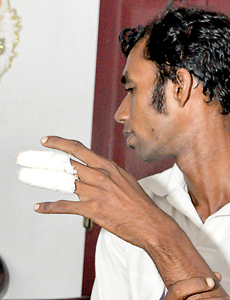TRC plans mobile phone serial number required for connection
The Telecommunications Regulatory Commission of Sri Lanka (TRCSL) is considering an island-wide programme whereby mobile operators must register the International Mobile Equipment Identity (IMEI) number, or serial number, of any device before allowing it access to networks, according to Dharmasiri De Alwis, the regulator’s Director of Projects.
Further, he also noted that the Sri Lankan government is planning to make it a requirement for all homes to have electric surge diverters, and there may also be subsidies given to promote this.
This and other comments were made by Mr. De Alwis at the Sunday Times Business Club monthly discussion last week, which

Dharmasiri de Alwis
was most recently held on the topic; “Mobile phones, its safe use, health and environmental aspects of telecommunication towers”. The Sunday Times Business Club (STBC) is sponsored by Etisalat and co-sponsored by Hameedia, with the monthly meeting held at Taj Samudra Colombo, the host hotel for this professional club.
Speaking on the issue of mobile tower safety, he revealed that there were 5,085 mobile towers in Sri Lanka, with the majority being constructed by mobile operators. The most recent records of the TRCSL showed Dialog with 1486, Mobitel with 703, Airtel with 922, Hutch with 423, and Etisalat with 785. He also opined that, since Sri Lanka lacked proper fibre optics cable system, which resulted in the need for telecommunication towers, there were many towers because line-of-sight was needed to ensure connectivity. At the same time, Mr. De Alwis also commented that as many as 15 per cent of the mobile phones available in the local market were illegally imported. And this was a concern because many did not have safety standards checked by the TRCSL, such as in terms of radiation being given off during calls, etc. He also indicated that when taxes on mobile phones had gone down, this number (of phones) had subsequently dropped.
Meanwhile, answering a question on the likelihood that Sri Lanka would adopt mobile number portability, whereby a subscriber could move their phone number to another network, irrespective of the mobile operator assigning the number, he said that, while this idea was being considered, it had not been very successful in other countries. He also noted that most mature mobile operators in the local market were not enthusiastic about this idea as newer players were seen to benefit more.

Sujeewa Karunasekera
Sujeewa Karunasekera, CEO – Softlogic Communications, the sole agent for Nokia, said their phones strictly adhere to all the specifications of the TRCSL but expressed concern about many other phones in the market which don’t follow the rules and would be unsafe. He also explained how to correctly hold the phone when answering a call so that the signal is not blocked (don’t place finger at the top of the phone) because a stronger signal means more radiation. Furthermore, he pointed out that if the signal is weak, the recipient of the call should move to a location where the signal is stronger – the stronger the signal the less the radiation.
Lakshitha Wijesinghe, Product Manager – Solutions and Devices at Etisalat, providing the service provider’s viewpoint,

Lakshitha Wijesinghe
produced many foreign research studies by the World Health Organisation and others to show that mobile phones are safe and doesn’t emit dangerous radiation levels. He also noted that it is safer to use a mobile phone during lighting than a land line and gave a detailed, technical explanation to back this position.

Dr Raveen Hanwella
Dr Raveen Hanwella, Consultant Psychiatrist, National Hospital of Sri Lanka, referred to some of the possible health hazards but the biggest problem, he found, was a non-health issue in the use of mobile phones. “Husbands want to know where their spouses are or wives want to know where their husbands are,” he said, referring to those who came to his clinic. “It leads to strains in relationships and many other marital issues.”
He said accidents also often happened, in some cases fatal, when motorists took calls or tried to send text messages while driving.
Follow @timesonlinelk
comments powered by Disqus






















